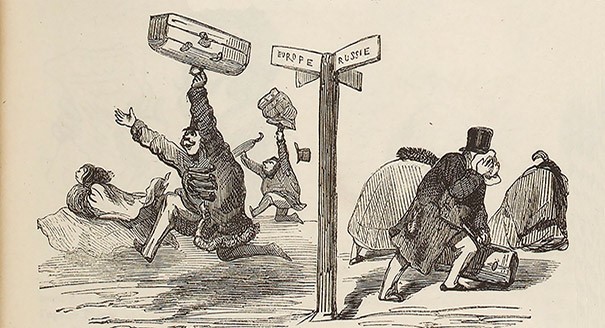By Gert-Jan Meyntjens
Particularly interesting for cultural studies students with an interest in Eastern Europe and Russia is the lecture series on Russia’s place in the world organized by KU Leuven’s Centre for Russian Studies in collaboration with Bozar. The lecture series is free for students. The majority (6/8) of the lectures are in English. Two talks take place in Bozar.

In his book ‘In-between two worlds. Studies on the inhabitants of Eastern Europe’ (1943), the somewhat controversial Utrecht professor Lodewijk Grondijs presented a historical-ethnographic analysis of Eastern Europe from such a biased, patriarchal perspective that one would think it completely outdated. Nowadays however, the perception of the post-Soviet region – and especially Russia – is still not devoid of bias and more often than not entails a perception of threat.
This semester, KU Leuven’s Centre for Russian Studies organizes a series of fall lectures on the place and perception of Russia in the world. The talks will focus on the different regions that turned out to be of great importance to Russia at different times in history: its ‘Near Abroad’, but also the Middle East, Asia, and the West. Not only will they look at the role that Russia took upon itself throughout the centuries, but the lecture series also aims to assess where Russia found common ground with these regions, yet also what set Russia apart from the rest of the world. In eight lectures by distinguished scholars, Russia’s place, influence and perception in the world will be discussed from a multidisciplinary perspective.
In the opening lecture of the series “The Confrontation between Russia and the West: a New Order in the Making?”, prof. Tom Casier will discuss relations between Russia and the West. Relations between Russia and the West are going through the deepest crisis since the end of the Cold War. Moscow has blamed this on the humiliating treatment it underwent. Referring to the West’s renewed containment policy, Putin stated: ‘If you compress the spring all the way to its limit, it will snap back hard.’ Many in Europe, in contrast, see the current crisis as the result of the assertive and imperialist foreign policy of reemerging Russia.
Both views are simplistic accounts of a much more complex reality. How then did we get into today’s confrontation? How deep is the crisis? This lecture seeks to grasp the essence of the conflict against the background of culminating tensions in the years before the Ukraine crisis. The story is one of power struggles at different levels, diverging perceptions and narratives of humiliation and threat. The question is raised whether the crisis between Russia and the West is part of a global reconfiguration of forces. Do we see a coalition arising that challenges Western hegemony? And is Russia as powerful as it seems or will the current confrontation only catalyze a return to what Putin’s aide Vladislav Surkov called a return to ‘one hundred years of geopolitical solitude’?
For more info and registration:
https://www.arts.kuleuven.be/crs/english/news/lecture-series-2018
https://www.facebook.com/events/328740034340525/
PROGRAMME:
3/10 – Opening lecture – Global perceptions and the discourse of humiliation in Russia. Prof. Tom Casier, Jean Monnet Chair, School of International Studies, University of Kent (Faculty of Arts)
10/10 – Alexander I in het post-1815 Europese veiligheidsbestel. Prof. Beatrice de Graaf, Universiteit Utrecht. De lezing begint uitzonderlijk om 20:00u. (Faculty of Arts)
24/10 – Russia’s first ‘Orient’: the Crimea in the 18th Century. Prof. Sara Dickinson, University of Genova (Bozar)
7/11 – The U.S.-Russia Relationship under Trump: a story about the limits of a Bromance. Prof. Bart Kerremans, Leuven Institute International and European Studies, KU Leuven. (Faculty of Arts)
21/11 – Western elite art collections in the Hermitage. Dr. Catherine Phillips, Hermitage Saint Petersburg (Bozar)
28/11 – Een vergeten episode in de Rusland-Japan relatie: de moordpoging op de toekomstige tsaar Nicholaas II in Japan 1891. Prof. Dimitri Vanoverbeke, KU Leuven (Faculty of Arts)
12/12 – Russian Hajj. The Russian Empire and the Pilgrimage to Mecca. Prof. Eileen Kane, Connecticut College (Faculty of Arts)
19/12 – Closing lecture – Russia and the West, the challenges of a Structured Dialogue. Ambassador Paul Huynen, OSCE (Faculty of Arts)
PRACTICAL INFORMATION
Time: Wednesday 19.30 – 21.00.
Place: the location of the lecture is always indicated: Justus Lipsiuszaal, Faculty of Arts KU Leuven (Blijde Inkomststraat 21, Leuven 3000) or Rotonde Bertouille zaal, Bozar (Ravensteinstraat 23, Brussel 1000).
Language: English or Dutch
Entrance fee: 10 € per lecture, 70 € for the entire lecture series. Students and KU Leuven staff can attend the lectures for free.